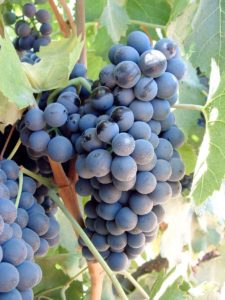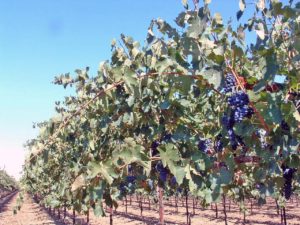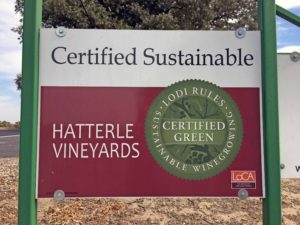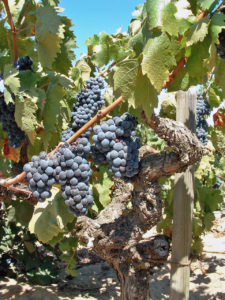OCTOBER 19. 2017. BY STAN GRANT, VITICULTURIST.
Every business has an identity – that is a commonly held impression of its character within its market. For example, those of us involved in the winegrape industry hold certain perceptions about other vineyard businesses we know and wineries we deal with. Some of them are favorable and some are otherwise.
Accordingly, your vineyard operation has an identity, even if you make no effort to affect one.
Since a vineyard business has to be about something, it might as well be something positive. Actually, cultivating a positive vineyard identity is of paramount importance for couple of reasons. It helps buyers understand what your vineyard business is about (i.e. yield, quality, timeliness, specific varieties, etc.) and how it compares with other vineyard businesses. In this way it contributes to a vineyard’s competitiveness in the winegrape market. It also helps your staff direct their efforts on your behalf.
Perhaps the best place to start to solidify your vineyard business identity is through the strategic planning process, which involves the development of a mission, vision, and values statement. The mission defines the basic purpose of the operation, the vision states what you want it to be, and the values are the convictions of your core staff (Fig. 1). This exercise not only makes it clear what your operation is about, but it also provides an organizational foundation and direction for advancing the company.

Fig. 1. Consistent production of profitable yields of high quality winegrapes ought to be a part of the mission of every vineyard operation.
(Progressive Viticulture©)
In the course of forming your business identity, consider ways to differentiate it from others so that it stands out in the minds of winery customers. Distinctive varieties, clones, rootstocks, and vineyard designs (i.e. spacing-trellising-training-pruning system) are tangible means of differentiation (Fig. 2). Management style is another. This may be as simple as paying close attention to cultural details or providing wineries with services, such as lab analysis of fruit samples in the weeks preceding harvest. Alternatively, management styles may be as elaborate as sustainable winegrape growing certification, as with the LODI RULES program (Fig. 3). Naturally, the overall management style of a vineyard operation reflects the personality of the vineyard manager and his or her staff. The most successful management styles, however, characteristically involve a cooperative attitude, regular communication with grape buyers, and consistent production of winegrapes delivered on time that meet or exceed quality standards. These actions build trust, which is highly valued by most grape buyers.

Fig. 2. A well managed Wye trellis demonstrates the commitment of this vineyard operation to quality. (Progressive Viticulture©)

Fig. 3. The LODI RULES for Sustainable Winegrowing is the premier sustainable certification program.
(Progressive Viticulture©)
A vineyard marketing effort is a logical outgrowth of strategic planning. Marketing encompasses communicating the value of products and services to potential buyers and building long-term relationships with them. Of course, marketing requires careful consideration of who potential buyers are and what they need, as well as how you can best deliver it them. Typically, marketing efforts are focused on a particular segment of the wine industry or even a specific winery, but they may also be directed towards the industry in general. In addition, winegrape marketing efforts are usually low-key, but persistent. In this regard, a grower ought to be ready to present his or her vineyard and tell his or her story whenever an opportunity arises (Fig. 4). Marketing is a worthwhile activity for winegrape businesses because it effectively concentrates its communication efforts and increases its competitiveness. Perhaps more important, it lessens market risk and thereby, increases income stability.

Fig. 4. An heirloom vineyard is central to the story of this family farming operation.
(Progressive Viticulture©)
The basic elements of comprehensive marketing include the 4 P’s – product, promotion, price, and pipeline (distribution). Some marketers include positioning as a 5th P. Positioning is creating an identity within a market, which brings us full circle to the opening topic of this article.
Here are some final thoughts on marketing for your consideration. Growing region, district, and appellation (AVA) are other ways to differentiate and promote a community of vineyard operations. Many regions now support grower associations and/or commissions – like the Lodi Winegrape Commission – whose goals include increasing regional recognition and correspondingly, regional winegrape value. For this reason, supporting well organized and systematic regional promotional efforts is a prudent investment for winegrape businesses. Remember what JFK said – “a rising tide lifts all boats”. Fortunately for winegrape growers in Crush District 11, the Lodi Winegrape Commission has been a potent marketing force, but their continued success depends on active grower involvement.
In summary, vineyard businesses have identities within the winegrape industry, which may be negative, neutral, or positive depending on impressions and experiences. In an ever competitive business environment, the continuing success of a vineyard endeavor increasingly depends on consistent efforts to maintain stature within the winegrape market and to build strong relationships with grape buyers.
A version of this article was originally published in the Mid Valley Agricultural Services December, 2012 newsletter and was updated for this blog post.
Further Reading
Baker, M. Ten steps to successful winegrape marketing. Practical Winery and Vineyard. Jul/Aug 2004.
Caputo, T. Growers need marketing, too. Wines and Vines. Dec 2006.
Nord, J. Winegrape marketing. Wine Business Monthly. Apr 2003.
Sources of grape and wine market information.
Allied Grape Growers. The Allied Press. www.alliedgrapegrowers.org
California Grape Crush and Acreage Reports. www.nass.usda.gov/Statistics_by_State/California/Publications
Ciatti Company. Ciatti Insights. www.ciatti.com
Gomberg-Fredrikson. Gomberg-Fredriskson Report. www.gfawine.com
Silicon Valley Bank. State of the Wine Industry. www.svbank.com
Turrentine Brokerage. Market Update. www.turrentinewinebrokerage.com
Wine Business Monthly. Wine Business Insights. www.winebusiness.com
Wine Market Council. Consumer Tracking Study. www.winemarketcouncil.com
Have something interesting to say? Consider writing a guest blog article!
To subscribe to the Coffee Shop Blog, send an email to stephanie@lodiwine.com with the subject “blog subscribe.”
To join the Lodi Growers email list, send an email to stephanie@lodiwine.com with the subject “grower email subscribe” or click on “join our email list” to the right.
To receive Lodi Grower news and event promotions by mail, send your contact information to stephanie@lodiwine.com or call 209.367.4727.
For more information on the wines of Lodi, visit the Lodi Winegrape Commission’s consumer website, lodiwine.com.

